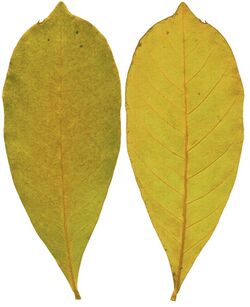Biology:Synsepalum brevipes
From HandWiki
Short description: Species of plant
| Synsepalum brevipes | |
|---|---|

| |
| Leaf detail - upper and underside | |
| Scientific classification | |
| Kingdom: | Plantae |
| Clade: | Tracheophytes |
| Clade: | Angiosperms |
| Clade: | Eudicots |
| Clade: | Asterids |
| Order: | Ericales |
| Family: | Sapotaceae |
| Genus: | Synsepalum |
| Species: | S. brevipes
|
| Binomial name | |
| Synsepalum brevipes | |
| Synonyms | |
| |
Synsepalum brevipes is a shrub or medium-sized to large tree in the family Sapotaceae,[4] that is native to the African tropics and subtropics.
Range and habitat
It occurs in the African tropics and in subtropical lowlands from Angola to Zimbabwe and Mozambique. It occurs in dry evergreen forest or as a component of riparian vegetation.[5]
Description
Damaged wood or bark exudes a milky latex, and the bark's slash mark is red.[5] Twigs and young leaves have a downy texture. The sweet-scented flowers are produced from late summer to autumn. Edible fruit appear in late winter and contain one smooth seed.
References
- ↑ Palmer-Newton, A. (2019). "Synsepalum brevipes". IUCN Red List of Threatened Species 2019: e.T120223710A120223722. doi:10.2305/IUCN.UK.2019-2.RLTS.T120223710A120223722.en. https://www.iucnredlist.org/species/120223710/120223722. Retrieved 20 November 2021.
- ↑ "Synsepalum brevipes (Baker) T.D.Penn.". The Trustees of the Royal Botanic Gardens, Kew. n.d.. https://powo.science.kew.org/taxon/urn:lsid:ipni.org:names:962748-1.
- ↑ "Synsepalum brevipes (Baker) T.D.Penn.". The World Flora Online Consortium. n.d.. http://www.worldfloraonline.org/taxon/wfo-0000318137.
- ↑ Coates Palgrave, Keith; Coates Palgrave, Meg (1983). Trees of Southern Africa (2nd rev. ed.). Cape Town: C. Struik. ISBN 0-86977-081-0.
- ↑ 5.0 5.1 Hyde, Mark. "Synsepalum brevipes (Baker f.) T.D. Penn.". http://www.zimbabweflora.co.zw/speciesdata/species.php?species_id=143720. Retrieved 7 July 2015.
External links
Wikidata ☰ Q7662645 entry
 |


